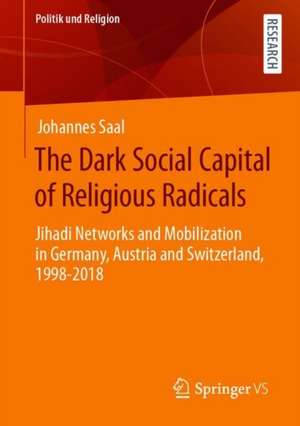The Dark Social Capital of Religious Radicals: Jihadi Networks and Mobilization in Germany, Austria and Switzerland, 1998–2018: Politik und Religion
Autor Johannes Saalen Limba Engleză Paperback – 5 mai 2021
Din seria Politik und Religion
- 13%
 Preț: 412.78 lei
Preț: 412.78 lei - 17%
 Preț: 522.72 lei
Preț: 522.72 lei -
 Preț: 497.75 lei
Preț: 497.75 lei -
 Preț: 420.97 lei
Preț: 420.97 lei -
 Preț: 352.80 lei
Preț: 352.80 lei -
 Preț: 420.97 lei
Preț: 420.97 lei -
 Preț: 420.20 lei
Preț: 420.20 lei -
 Preț: 457.24 lei
Preț: 457.24 lei -
 Preț: 208.03 lei
Preț: 208.03 lei -
 Preț: 279.23 lei
Preț: 279.23 lei -
 Preț: 357.43 lei
Preț: 357.43 lei -
 Preț: 358.02 lei
Preț: 358.02 lei -
 Preț: 457.42 lei
Preț: 457.42 lei -
 Preț: 358.02 lei
Preț: 358.02 lei -
 Preț: 460.52 lei
Preț: 460.52 lei - 15%
 Preț: 451.16 lei
Preț: 451.16 lei -
 Preț: 418.29 lei
Preț: 418.29 lei -
 Preț: 419.43 lei
Preț: 419.43 lei -
 Preț: 422.90 lei
Preț: 422.90 lei -
 Preț: 419.81 lei
Preț: 419.81 lei -
 Preț: 455.71 lei
Preț: 455.71 lei -
 Preț: 350.89 lei
Preț: 350.89 lei -
 Preț: 356.66 lei
Preț: 356.66 lei - 15%
 Preț: 451.50 lei
Preț: 451.50 lei - 15%
 Preț: 443.13 lei
Preț: 443.13 lei - 15%
 Preț: 475.47 lei
Preț: 475.47 lei -
 Preț: 352.63 lei
Preț: 352.63 lei - 15%
 Preț: 439.38 lei
Preț: 439.38 lei - 15%
 Preț: 450.48 lei
Preț: 450.48 lei -
 Preț: 410.58 lei
Preț: 410.58 lei -
 Preț: 425.80 lei
Preț: 425.80 lei
Preț: 705.18 lei
Preț vechi: 829.63 lei
-15% Nou
Puncte Express: 1058
Preț estimativ în valută:
134.94€ • 139.42$ • 112.25£
134.94€ • 139.42$ • 112.25£
Carte tipărită la comandă
Livrare economică 19 martie-02 aprilie
Preluare comenzi: 021 569.72.76
Specificații
ISBN-13: 9783658328412
ISBN-10: 365832841X
Ilustrații: XXII, 527 p. 50 illus.
Dimensiuni: 148 x 210 mm
Greutate: 0.65 kg
Ediția:1st ed. 2021
Editura: Springer Fachmedien Wiesbaden
Colecția Springer VS
Seria Politik und Religion
Locul publicării:Wiesbaden, Germany
ISBN-10: 365832841X
Ilustrații: XXII, 527 p. 50 illus.
Dimensiuni: 148 x 210 mm
Greutate: 0.65 kg
Ediția:1st ed. 2021
Editura: Springer Fachmedien Wiesbaden
Colecția Springer VS
Seria Politik und Religion
Locul publicării:Wiesbaden, Germany
Cuprins
Introduction.- Theory: The Dark Social Capital Of Religious Radicals.- Data Sources And Methods Of Data Analysis.- Socio-Demographic And Socio-Economic Backgrounds.- Dynamics Of Jihadi Networks.- Geographical Clusters.- Mobilizing Members.- Mobilizing Cohesion.- Mobilizing Funds And Charity.- Mobilizing Violence.- Conclusion.
Recenzii
“It is a timely and relevant piece of scholarship which, through the study of social elements at play in the process of radicalisation, offers a nuanced perspective of radicalisation as a social process and effectively demonstrates the transformative power of social capital within extremist groups. The book is a valuable addition to the literature on terrorism and radicalisation, contributing fresh insights and a new perspective by moving beyond traditional, security-focused narratives.”(Lulie El-Ashry, Religion in Austria, Vol. 8, 2023)
Notă biografică
About the author
Sociologist of religion and political scientist Dr. Johannes Saal is a research assistant at the Center for Religion, Economy and Politics (University of Lucerne).
Textul de pe ultima copertă
With the departure of European Muslims to the “Islamic State” and a wave of terrorist attacks in Europe in recent years, the questions of why and how individuals radicalize to Jihadi extremism attracted keen interest. This thesis examines how individuals radicalize by applying a theoretical framework that primarily refers to social capital theory, the economics of religion, and social movement theory. The analysis of the biographical backgrounds, pathways of radicalization, and network connections of more than 1,300 Jihadi extremists from Germany, Austria, and Switzerland shows that radicalization primarily need to be considered as a social process of isolation from former social contacts and affiliation with a new religious group. Radicalization is characterized by the transformation of social capital and often channeled through so-called “strong ties” to friends and family members. These peer networks constitute the social fundament of radical clusters on the local level which are usually linked to a broader milieu through exclusive mosque communities and religious authorities. Bonding social capital within these radical groups minimizes the risk of betrayal and promotes trust essential for clandestine and risky activities.
About the author
Sociologist of religion and political scientist Dr. Johannes Saal is a research assistant at the Center for Religion, Economy and Politics (University of Lucerne).
About the author
Sociologist of religion and political scientist Dr. Johannes Saal is a research assistant at the Center for Religion, Economy and Politics (University of Lucerne).
